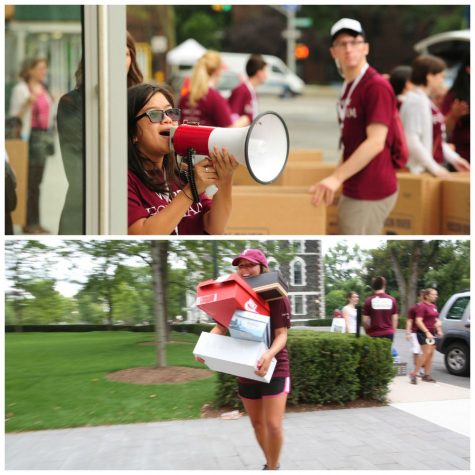Prisoner Discusses Working for Aramark, Students Call on Fordham to Cut Ties
An American flag catches the September breeze as workers contiue the construction of the new McGinley Center. This is the latest building project being partially paid for by Aramark, who employs incarcerated workers that earn 15 cents an hour. (Joergen Ostensen/The Fordham Ram)
September 16, 2020
Editor’s note: Abdullah is an incarcerated person in Indiana. His name has been changed to protect him from possible punishment within the prison.
In an Indiana prison that contracts Aramark for food service, Abdullah finds the food they serve unsanitary and feels he was previously enslaved by the multinational corporation. Abdullah used to work for Aramark earning between 15 and 20 cents an hour. He remembers seeing labels marking food as, “For Prison Consumption Only.”
“What is ‘For Prison Consumption Only?’” he asked. “You can’t feed it to people in the free world?”
He said while working for Aramark, there was often no soap for the dishes and no chemicals to clean the bathroom. Vermin often found their way into the food he was asked to serve to other incarcerated people.
“It could be a rat, or a mouse, or a roach in the food,” he said. “And you’ll point it out [and say], ‘Well, we got to dump this.’ [They would respond] ‘No, we don’t got to dump this. Scoop that out, serve it.’”
The portions on the trays were often child-size, he said, yet excess food was thrown away every night. Whenever his coworkers fell ill, they were accused of faking it and were instructed to go back to work, sometimes despite noticeable symptoms.
“[A prison worker was] spitting up blood, coughing, snot running out his nose, turning different colors,” he said. “[The response was] nah, you’re not going back, we’re gonna work you.”
Abdullah, who is Black, considers the terms of his employment with Aramark a continuation of racialized chattel slavery.
“We’re doing the majority of all the work, cooking the food, passing the food out, making the trays up,” he said. “We’re doing the majority of everything up there and [we’re] getting 15 and 20 cents an hour. It’s like being on a plantation.”
According to the 13th Amendment, slavery is legal in the United States if it is instituted as “punishment for crime.” Incarcerated people like Abdullah work jobs making far less than minimum wage all around the country.
Abdullah’s comments come as some students are calling for Fordham to cut ties with Aramark.
Shortly after the murder of George Floyd by Minneapolis police, the anonymously-run Fordham College at Lincoln Center-based Instagram account LC Sinners (@lc.sinners) started a change.org petition for signatures from students who “want to work with the Fordham administration to remove Aramark from Fordham’s payroll.”
The petition garnered 1,640 signatures and cited several articles that characterized food served by Aramark to prisoners as “rancid chicken, food infested with maggots [and] cake that was nibbled on by rats.”
Students at New York University (NYU) successfully campaigned for Aramark’s removal from their campus, and a similar campaign exists at Barnard College.
After the petition began circulating on social media, ASILI, the Black Student Alliance at Fordham, included it in their demands, calling on Fordham to “follow the lead of other universities, such as NYU, in cutting ties with Aramark, a company that has a history of prison abuse and racism.”
LC Sinners said they hoped Fordham would divest from Aramark and be a model for other universities.
“Fordham pulling away from Aramark would influence other schools to do so too,” the group said. “This would show the food catering industry that if they don’t want to lose business that they have to treat prisoners humanely.”
Abdullah also called on Fordham to end its contract with Aramark.
“Y’all shouldn’t be dealing with them at all, period,” he said. “[Fordham] should cut [their] contract and find someone else.”
Deming Yaun, the university dining contract liaison, said Aramark and Fordham have a mutually beneficial partnership. According to Yuan, the corporation signed a 10-year contract with Fordham in 2016, valued at tens of millions of dollars, replacing Sodexo, a similarly large company.
Part of the reason Fordham chose Aramark was that they provided advance capital for investments into new dining locations and renovations to existing ones. This helped pay for the installations of Starbucks and Argo Tea. Aramark’s corporate vision has aligned nicely with Fordham’s, Yaun said, and they have been able to attract more students who are not required to purchase meal plans.
Currently, Aramark contributes capital to the new Marketplace in McGinley Center, which would not have been possible without the corporation.
“The University doesn’t have the money to build those new spaces and make the renovations, but contractors do,” Yaun said.
In 2019 Aramark ranked 198th on the Fortune 500 list, according to Fortune. It generated close to $16 billion in revenue. Abdullah, who is aware of the immense profits Aramark generates annually, said the bottom line was the only thing that mattered to them, which was why such flagrant health risks were allowed to go on.
“It’s about a dollar, that’s it,” he said. “They don’t care about your life. They don’t care about your situation; they don’t care about what you going through. It’s about money to these people.”
Kevin Rashid Johnson, a jailhouse journalist, also incarcerated in Indiana, has written about the connections between Aramark and the privatization trend in prisons. For him, abuse like this is endemic under capitalism.
“As is the case under this exploitative capitalist system, Aramark’s main drive is to exploit every opportunity to turn a profit, despite the obvious and known dangers to others’ lives and health,” Johnson wrote.
Abdullah said he felt bad serving the food to other prisoners he interacted with daily, eventually requesting another prison job. Aramark’s culture, to him, was totally out of touch with the new wave of consciousness inspired by the Black Lives Matter movement.
“No lives matter, it’s got to be their motto,” he said. “It’s all about money to them.”
Abdullah said the incarcerated workers were powerless to organize, unionize or to demand a fair wage collectively. If they attempted, the prison would send them into the torture of solitary confinment, under the auspices that they were trying to start riots.
“If you think of [organizing],” he said, “they gonna lock you down in that hole back there, and they gonna keep you there for years.”
He also said he repeatedly dealt with racism while working for Aramark, often having to deal with questions about where he was going with trays — questions that his white counterparts did not deal with.
“I could grab three trays on my way to take it to that department and I would get grilled by the Aramark staff members,” he said. “Where you going with the trays? Who gave them to you? What’s on those trays?”
Aramark has been a food service provider in prisons and jails across the United States for over 45 years, according to their website. Recently, state and federal policies of mass incarceration have led to an explosion in prison populations. The Bureau of Justice reports that the prison population grew from just over 300,000 people in 1980 to almost 2.3 million in 2017. The expansion of the carceral state has disproportionately affected Black people, according to NPR.
Aramark has been described by scholars and activists as a corporation profiteering off of mass incarceration policies and the imprisoned workforce those policies created.
Yaun said he has worked in this field for 40 years and has consistently dealt with questions about prison. Mass incarceration and slave wages are social problems, he said, but Aramark is a company well suited to fulfill the needs of prison facilities.
“They’re there, I mean, somebody has to feed them, and I’m happy that at least it’s someone with the same purchasing criteria [we have],” he said. “They have every opportunity to be served safe food. The issues are around instances where it wasn’t … that’s a breakdown to me.”
Fordham, Aramark and ASILI did not respond to multiple requests for comment.
Yaun said the issues here run far deeper than Aramark. According to him, there is a trend to rush to quick fixes, instead of “the conversationalists we used to be.”
“We would rather jump on a three-word phrase and cause a lot of disruption about it,” he said.
Jeannine Hill Fletcher, a professor of theology who helped organize the #ScholarStrike at Fordham, said Abdullah’s comments raise questions for her about Fordham’s relationship to exploitation.
“The words Abdullah chooses ask us to think about how we’re wrapped up in an economy of exploitation. Our Jesuit institutions in the era of slavery certainly benefitted from the exploitation and dehumanization of enslaved workers that was perfectly legal,” she said. “Are we still benefiting from a system that exploits incarcerated laborers through our partnership with Aramark, placing profits over people?”
Abdullah tries to avoid eating from the Aramark trays when he can, often buying ramen noodles and other food from the prison’s commissary, but he struggles both to afford it and find nutrition.
“You almost starving,” he said.












If you want a picture to show with your comment, go get a gravatar.